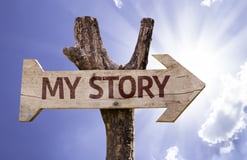Some years ago, our 19-year-old nephew traveled internationally for the first time to spend Christmas with our family at our home in Indonesia. We headed out to our favorite beach on a small island off Lombok. The flight from Bali was delayed by weather, so we arrived at the port for the final leg of the trip to the island well after dark. The ocean rolled, the outriggers on the small wooden boat struggled to balance, waves splashed over our suitcases, and the boatman had only a battery flashlight to light our way. I sat next to our nephew and asked what he thought of his first experience with the ocean. “Well,” he drawled, “it will make a good story.”

Turning a difficult experience into a story builds resilience.
Resilience literally means elasticity, or the ability to spring back into shape. In its figurative sense, resilience is the capacity to recover from difficulties. Sometimes, a difficult situation threatens to stop you in your tracks and immobilize you professionally. Resilience allows you to stand up and keep going.
After a difficult decision to resign from a very public position, I took time in that doorway of liminal space to reflect on my experience. A month after my resignation, I had the opportunity to share my experience as a case study with a group of professional peers. Framing my story as a case study with potential educational value for others gave me ownership of my experience. I shaped my presentation as a list of “lessons learned”. The curiosity and engagement of my peers validated my experiences. That list of lessons helped to redeem and transform my story as a learning opportunity that had value for others in their professional lives.
In my years of community development work in Africa and Asia, I regularly coached international partners in their cycles of project planning and implementation. A time of evaluation always followed the end of a project cycle before going on to the next phase. The best parts of their reports were the “lessons learned”. Partners would reflect on what went well and what did not go well as they implemented their plans. Then they would go on to explain how they would use that information to improve and strengthen their plans in the next project phase.
We learn from both positive and from negative experiences. Storytelling provides an opportunity to gain perspective so that no life experiences are wasted. Resilience grows when cycles of action and reflection roll into new actions that incorporate new learnings to keep us rolling forward.
As you reflect on a difficult experience, what learnings can you glean to keep you moving forward? Do you have a story just waiting to be shared?
Tags:
leadership resilience, leadership inertia, reflections, Story, perspective, Jeanne Zimmerly Jantzi, Clarity and Curiosity Blog/Jeanne%20Zimmerly-Jantzi%20Headshot%20(300x300).png)
January 27, 2022
Comments